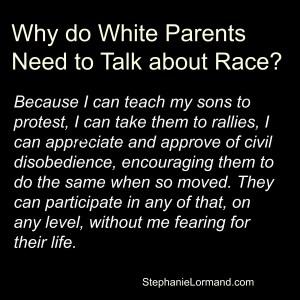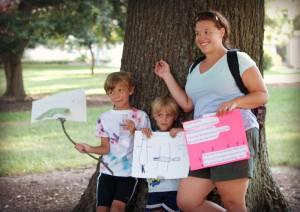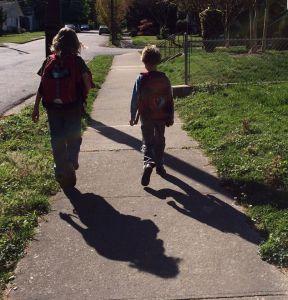Thursday, I took my children to school and came home to cook my breakfast, to drink a reheated cup of coffee, to write in the silent safety of my home. I spent Wednesday on keyboard advocacy and deliberately teaching my kids about race. I’m white, my sons, 9 and 7, are also white. This wasn’t the first time—we’ve been talking about race since the oldest was 4, but the way I talk about it changed after Michael Brown.
My hands shake almost too hard to type this. Why do white parents need to talk about race? Because I can teach my sons to protest, I can take them to rallies, I can appreciate and approve of civil disobedience, encouraging them to do the same when so moved. They can participate in any of that, on any level, without me fearing for their life.
That’s why I talk about everything despite the idea that I should protect their innocence. Protecting a child’s innocence by hiding violence? Do you do Easter? Hansel and Gretel? Rock-a-bye-baby? There’s violence all over what we teach our children, let’s not pretend that violence is the reason for why white parents don’t talk about race. The American reality is that being a black child– regardless of where they live– puts their life in more danger than either of my white children. That is not acceptable.
I’m a white, married, stay at home mom with a college degree, with a husband that generates enough income that I can work on writing my book rather than at a job. We’ve been broke, but not poor, and we’ve never experienced a financial catastrophe.Even if we had, both my husband and I have extended family able to provide financial assistance. I talk about the difference between my college experience—my working full-time versus roommates whose parents covered their living expenses. I tend to leave out the times when I needed quick cash loans from my parents. My husband didn’t work during the school year because he spent the summers, not at the beach or the pool, but scouting tobacco fields, or painting houses in the hot NC sun. Nevertheless, he kept all of that income, able to live with his parents who were financially able to absorb the expense of his room and board.
Even during the waves of jealousy for my friends and their spring break vacations, I quietly thought I was a better person because I worked and was high-level adulting, they were mere children. If anyone had asked me back then if I — financial-aid-receiving, independent-bill-paying, good-grade-getting — was equal to all students with those criteria, but without a parental safety net, I would have defended my answer of yes to the death.
I wouldn’t understand that simply being aware of my parents’ ability to provide financial assistance was a benefit to me regardless of whether I took advantage of it. I wouldn’t understand my own privilege until my junior year of college when, less than two months into my new position as a customer service manager of a grocery store, I tried to promote Beverly from office assistant to bookkeeper. After 4 years of being passed over because of scheduling restrictions, being promoted was a happy surprise to her. Her tears when I mentioned I put her in for a 25-cent per hour raise, an unpleasant surprise to me. She already knew that a quarter per hour would be just enough to push her over the top of the poverty line, eliminating her access to financial assistance. She did the math in her head, not only because was she intelligent, but also because she was an expert at down-to-the-penny-budgeting. To still pay rent and feed her children, to pay for the gas to and from work, without any state aid, she’d need a 35-cent raise. My corporate headquarters refused, they were already mad about the 25-cents. A dime– all that stood between her and the self-sufficiency demanded from single mothers by conservative political speeches.
Robbie worked all the departments and hours he was able–the poster boy for bootstrap pulling. He’d won a full tuition scholarship to ECU for the fall, but was joining the Marines instead. When he had applied, he didn’t know his foster parents planned to kick him out in May, because the checks stopped when he turned 18. He’d lived with them for 5 years, and had, until that moment in March, considered them his family.
Michael, a straight A high school student with no plans for college, already on the deferred Navy enlistment for after graduation. He worked any shift I gave him, and several times a week would either take the bus, or catch a ride to the store during peak hours, just in case somebody called out sick. If there wasn’t a shift, he’d do his homework in the breakroom for a few hours then go home. He called out once—the first bus had been late, causing him to miss the next, and his brother wasn’t home to give him a ride. I insisted over his protests on picking him up, driving my new-to-me red mustang less than a mile past the sleek apartments where the medical school students lived turning into a neighborhood that I knew only by reputation. The cop that followed me into the neighborhood continued to do so until I pulled up to Michael’s house, where he then parked so close to my bumper that I could nearly read his name tag. After Michael got in the car and I pulled away so did the cop, and when I wondered why, Michael said, “he thinks you’re here to buy drugs.”
“Oh, because of the car”, only to startle at the harsh laugh coming from the typically cheerful man-child in my passenger seat, “no, it’s because you’re white.”
Growing up within the circle of a large military base means exposure to racial and cultural diversity. Not just from my classmates, but also the teachers. Teachers are a set of first authority figures for many children. I didn’t grow up with the idea that black men were scarier than white men—all Army dads were equally terrifying. My first taste of the deep racial divide hiding in that town wouldn’t come until the county had to desegregate my middle school by busing out black kids and busing in the white kids.
Our schools were across the street from each other.
For all of the racial diversity from my teachers, my friends, and my neighborhood, the perspective I lacked– without even realizing it– wouldn’t come until those experiences with the Beverlys, the Robbies, and the Michaels in my early twenties. Race, when combined with a lack of economic opportunity in rural areas like Eastern North Carolina, results in a beast of inequity that can be nearly impossible to overcome. I knew this in theory, but that learned in class cannot replace truths lived in person.
Once I had kids, my world view changed yet again. The general attitude one of “Well, if it comes down to my kid or yours, I’m going to save mine” existed for all sorts of things–preschool, soccer, elementary school. It was never the saying of this that bothered me. It’s harsh, but that truth applies at some level to all parents. What bothered me was the unapologetic lack of regret in those attitudes, especially when the decision escalates from a spot on the soccer team to a body in the street.
Would I save my child’s life at the cost of another child—a stranger? How could any parent honestly give an answer that isn’t yes? Would having to make that kind of choice rip through my psyche and destroy my mental health for the remainder of my days on earth, even with the certainty and love I have for my own child’s life? How can you claim humanity if it would not.
How could any person become a mother, immediately accept the intensity with which we will go to protect our children from true harm, and not understand that a mother-not-you feels the exact same way? The challenge for us lies not in the protection, but in the accurate identification of danger. White parents have decided that it’s too dangerous for their children to play outside because they might be kidnapped. Black parents have to tell their children that it’s too dangerous for them to breathe deeply around a cop. This is not acceptable.
This will be where I lose 2/3rd of the ones that didn’t already ghost when I started talking race. Grown men– y’all are struggling. Between your letters excusing your sons of rape, your defense of a celebrity’s lifetime of sexual predation, your refusal to hear and understand the word no? I cannot today. Even though it will be hard to accept something not for you, I’m talking to the women.
Mothers of sons—we are racially divided by our individualized, specific fear for them, and until white women accept that they cannot remain colorblind about the difference in real and perceived risk, isolated we will remain. My sons are safer than my friend’s son– independent of any other factors– just because they are white. THIS IS NOT ACCEPTABLE.
I don’t see my sons’ face in Tamir Rice, my husband in Philando Castile, or my brother in Terrence Crutcher. I’ve never created a checkpoint schedule to verify my husband’s safety when he drives somewhere. I can put a toy gun in either of my son’s hand and never worry they’ll be shot. I can take them to a firing range, hand them a real gun, and no one will fear them having a weapon. In truth, I’ll be praised for teaching them to protect themselves from criminals.
I don’t need to see my white men in the faces of dead black men to feel rage at their murders. Black men don’t need to be my son/husband/brother/father for their lives to have value to me. I don’t require proof of the “goodness” of their character to decide that cops shouldn’t be shooting them on the street. Think about that.
Until a few days ago, my children had never seen a police officer searching a person on the street. They’ve never seen a police officer searching their father. They’ve never been passengers in a car pulled over by a police officer for any reason. They can go weeks without seeing a patrol car driving down their street. They don’t have to know that any of that exists for anyone else. I don’t have to warn them about getting pulled over each time an officer was behind my registration-expired vehicle.
I didn’t have to explain that even though more white people are arrested, prosecutors and judges sentence black defendants for longer prison terms. I didn’t have to show them the mugshot pictures on our local news website, and point out how many times a black man’s charge list ends with something like “driving with a broken taillight.” I didn’t have to tell them when my childhood friend—a black man I’ve known since 1st grade, said in a message to me—that, yes, he puts his hands a certain way when he’s pulled over by a cop.
When, not if.
Both of the previous paragraphs are the unearned benefit granted to them for having white skin and white skinned parents. This is privilege.
When my youngest son said last year, “it’s only the brown-skinned boys getting in fights in the lunchroom” and this year “the brown-skinned troublemaker kicks me when I try to play soccer” I’m left with thoughts of those mothers, of my friend, of the possibilities and futures bleeding to death in our streets.
I could have gone the white savior route, gently explaining how living in poverty is a tough environment for a child, based on my own assumption about where the child lives. White moms, please stop suggesting that the reason these black kids are getting in fights is because they are poor and probably don’t have a Daddy at home. Many poor, fatherless black and white kids don’t get in fights, and many rich, two-parent white kids do. Even if you suspect with near certainty that a traumatic home life, for whatever reason, is triggering a child into acting out, the violence is a symptom of the trauma, not of the race. You should talk about poverty, you should talk about racial inequity, you should talk about the many ways a person might express trauma, but those need to be separate from the conversations about violence with your 7-year-old.
“I don’t see color.”
White moms, this is not working. I’m not going to try to convince my kid that the three fights he saw with his own eyes weren’t actually fights. Or that the kids he saw fighting weren’t black. Or that he was probably absent the day the white kids fought. I’ve gone the poverty-explanation route in the past, and it was a mistake. Luckily, my 9-year-old was quick to point out that in 3rd grade, boys of all races fight, but at the playground where they won’t get caught.
Well-meaning white ally moms trip over themselves in their rush to create an empathetic response to those Poor Black Kids—see where I’m going?
Classic white savior complex.
What I realized after my 9 year old’s comment about the playground fighting, is that my quickness to create empathy for why black kids fight in the lunchroom, I almost missed the opportunity to focus on the root of the issue at this moment– what did he mean by troublemaker? I started remembering how often I’d reframed this language for both of them, bad behavior, not bad kid, and I realized how easily it is to go from bad kid versus good kid to criminal versus law-abiding. Boys are already perceived as more physical and harder to control than girls, adding racial factors becomes both the prediction and validation. A teacher already biased by the belief that kids from that neighborhood, or with that skin color will be troublemakers might monitor that child’s behavior under a microscope, each mistake magnified without end. Sociologists call this a
self-fulfilling prophecy.
I understand how it happens, I do the something similar to both husband and children, which is why I am positive that using this method isn’t just a matter of “doesn’t work” it’s also a matter of “makes it worse.”
What if those teacher and adult biases that cause the close-monitoring of a black child’s behavior is also the reason why nobody notices the growth of the silent rage in white boys until after it erupts from guns with mass shootings of elementary schools, movie theaters, and churches?
What if we talked about race and anger? How many times has an adult told a child, “there’s no reason to be angry about that!” What if we stopped teaching kids that feeling angry, never mind expressing that anger, means someone is a bad person– a troublemaker. Because if anger is scary or taboo, then whatever feelings that feed it are ignored too.
Do you think that black children aren’t over-hearing the anger and fear in their community, or that they don’t know that a black boy has higher chance of arrest, prison, or death? Do you honestly believe that all of these children have the same luxury of innocence as your white children? Do you think black kids—no matter where they live—don’t have the right to be angry and afraid? My easy-going 9-year-old kicked the snot out of his younger brother last week after a single hard foul during a basketball game. Not because of that foul, but because of that foul, plus the ten hard fouls from day before. Children, no matter how “good” they are, have breaking points.
I’ve put myself in many situations that my fellow white people consider scary and dangerous. One of the few times my personal safety felt at risk was a Saturday, during the day, on a busy street, surrounded by white people. The source? A single white man who became very angry when I used my body to block the image of an aborted fetus on his sign while singing “Wheels on the Bus” over the filth he yelled at a car trying to pull out of a lot.
Anger is a boy thing, far more than it’s a race thing, they only merge
because of the implicit bias adults have about black men. Don’t believe you have bias?
Take the test.
White parents blind themselves, because anger is uncivilized, and talking about race is uncomfortable. Just know that my kid is going to ruin your kid’s innocence, and he’s going to do it with specificity of truthful language that your child might find upsetting.
Last summer, my oldest pulled a 1930s version of Mark Twain’s Tom Sawyer off my bookshelf. There were many unfamiliar words and phrases, so he would read them out loud when he didn’t understand. That would be the day I first had to define the word none of us say anymore, since, you know, he’d just said it. After I finished, I realized something. White people have replaced that word (and rightly so) when talking about racism, but our choice replacement– “n-word”– doesn’t adequately capture the historically violent symbolism. If I’m calling out a white person, who I also can verify as rip-roaring racist, I’m going to be specific. If I’m trying to express how it’s still used against black people, I used to name it for what it was– a racial slur. But today that naming doesn’t feel strong enough. Racial epithet? Racial terrorism?
Even though we’ve always talked about race did I want to define the meaning of the word for racial terrorism for the 9-year-old that asked and the 7-year-old that overheard it? No! I wanted to just snap– NEVER SAY THAT– and go about my day. But that’s been the chosen method of white people for decades, only to find ourselves shocked 1) when it’s used by a racist to terrorize, and 2) that not saying those words didn’t erase racism. Bless our hearts.
Let’s play a game. Every time you hear the word criminal, replace it with black.
NRA:"America needs guns to protect ourselves from the criminals.”
NRA:“America needs guns to protect ourselves from the blacks."
Just like that, it’s clear why the NRA never takes to the TV after a black person is shot saying, “this why black people need to make sure they protect themselves with a gun.” Have you heard them say that? I haven’t. Painting with the similar brush:
NRA: "Good guy with a gun."
NRA: "White guy with a gun."
The most incredible part of this restructured wording is that it means almost all of mass shooting events have been the actions of a good guy, not a criminal.
We fear a black man with a book, but trust the white guy with a gun.
NRA: "Criminals don't follow the law."
NRA: "Blacks don't follow the law."
Us: "The mass shooter was a white male..."
NRA:"A mentally ill white male shot..."
Words change, intent does not.
I’ve pointed out these differences in the media to both kids, and now the 9-year-old jumps up from reading Time magazine to show me examples.
Kids talk to each other, and they repeat what their parents say. My kid was the kindergartner ruining the happy version of Christopher Columbus, and I expect he’ll do the same for President’s Day. After all, the Founding Fathers story is America’s most famous piece of fiction. Do you feel the inspiration in your chest when you hear “all men are created equal”? Are you black, a female, or someone whose family does not have 400 years worth of wealth? Because if you answered yes to any of that—the founding fathers (whispers) weren’t talking about you, either.
White parents, if you find yourself wondering what you can do to end the cycle of racism in this country? Talk to your kids. Name it. Talk to your friends. Name it. And if you are afraid to talk about race with your kids or with other white people, imagine the fear felt by those living it.







The views and opinions expressed in this post are those of the author(s) and do not necessarily reflect those of MomsRising.org.
MomsRising.org strongly encourages our readers to post comments in response to blog posts. We value diversity of opinions and perspectives. Our goals for this space are to be educational, thought-provoking, and respectful. So we actively moderate comments and we reserve the right to edit or remove comments that undermine these goals. Thanks!